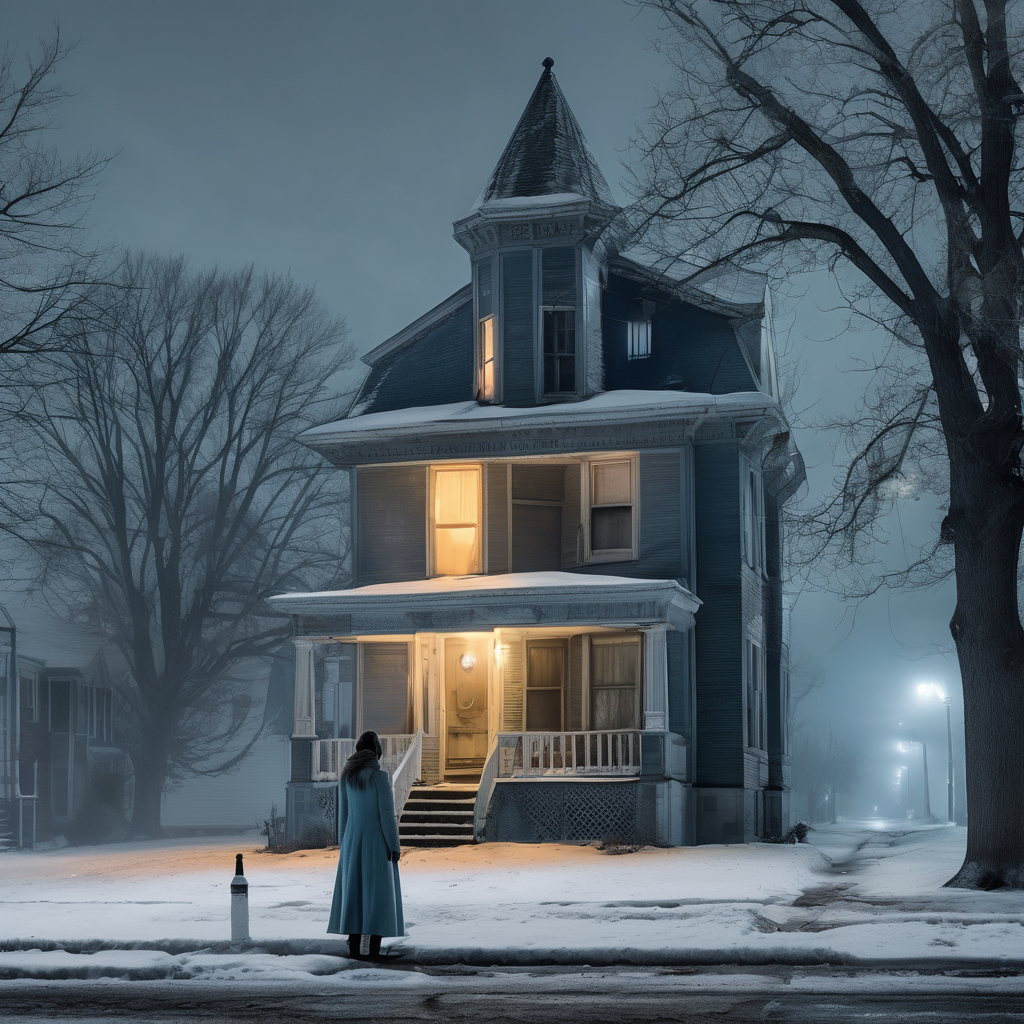The real estate market had collapsed so completely that entire neighborhoods stood vacant, their FOR SALE signs weathered gray as tombstones. Maya walked these hollow streets each night, drawn by something she couldn’t name, her breath forming clouds in the October air.
She’d lost her own house three months ago—another casualty of the economic downturn that had swept through the Midwest like wildfire. Now she rented a studio apartment above the old pharmacy, but sleep eluded her. Instead, she found herself wandering past the empty Victorians and abandoned colonials, their dark windows watching her passage.
It was on the third Thursday of her nocturnal wanderings that she first heard them singing.
The sound emerged from a pale blue house on Elm Street, its voice high and reedy like wind through broken glass. Maya stopped, her heart hammering. The melody was wordless but achingly familiar, as if she’d known it in childhood and forgotten. As she listened, another voice joined from the yellow house across the street—deeper, more resonant, harmonizing in a minor key that made her chest tight with longing.
One by one, the empty houses began to sing.
Their voices rose from foundations and attics, from rooms where families once gathered and children once played. Some sang of birthday parties and Christmas mornings, their tones bright with remembered joy. Others mourned in darker registers—singing of arguments that ended in slammed doors, of foreclosure notices taped to kitchen tables, of the hollow echo of footsteps carrying the last belongings to moving trucks.
Maya found herself walking toward the pale blue house, her hand reaching for its unlocked door. Inside, dust motes danced in moonbeams, and the walls hummed with the ghost of laughter. She could see them suddenly—translucent figures gathered around a piano that was no longer there, a mother teaching her daughter to play while the father looked on, smiling.
The vision faded, but the song continued.
She moved from house to house, each one opening to her touch, each one revealing its own spectral memories. In the colonial on Maple, she witnessed a couple’s first dance in their new living room, boxes stacked around them like cardboard witnesses. In the Tudor on Oak, she saw a grandfather reading bedtime stories, his voice the same bass rumble that now shook the floorboards beneath her feet.
The houses were singing their histories, she realized. All the love and loss they’d sheltered, all the moments that had soaked into their walls like rain into wood. With their families gone and their purposes ended, they sang themselves to sleep.
Maya began to visit them regularly, learning their individual voices, their particular sorrows and joys. The Cape Cod on Pine sang lullabies in perfect pitch. The ranch house on Cedar hummed with the contentment of Sunday dinners. The Victorian mansion at the end of Elm Street sang only funeral dirges, its voice cracked with old grief.
As autumn deepened toward winter, more houses joined the midnight choir. The economic crisis had spread, claiming even the occupied homes. Each newly emptied house added its voice to the nocturnal symphony, their songs fresh with recent heartbreak.
Maya began bringing offerings—wildflowers for the house that sang of a mother’s garden, toy cars for the one that remembered a little boy’s room, sheet music for the home that had sheltered three generations of musicians. The houses accepted these gifts gratefully, their voices growing stronger, more harmonious.
One night in November, as snow began to fall, Maya heard a new voice in the choir. It was coming from her own former home, the little craftsman bungalow where she’d lived for eight years. Its song was different from the others—not mournful, but searching. Calling.
She stood before its familiar green door, her key still working in the lock. Inside, everything was exactly as she’d left it, covered in a thin layer of dust. The house sang to her of quiet mornings with coffee and crosswords, of the garden she’d tended in the backyard, of the night she’d painted the bedroom walls lavender because it felt like hope.
In the kitchen, she found them waiting—not ghost memories this time, but the spirits of all the empty houses, gathered like a congregation. They were beautiful and terrible, built of moonlight and sorrow, of love and abandonment. The pale blue house stood beside the yellow colonial, the Tudor sheltered the Cape Cod, and at their center was the Victorian mansion, ancient and regal.
“We’re leaving,” the mansion said, its voice like wind through empty rooms. “The bulldozers come with spring. The city has declared us blighted.”
Maya felt tears freeze on her cheeks. “Where will you go?”
“Where all forgotten places go,” said the craftsman bungalow, her own lost home. “But first, we wanted to thank you. For listening. For remembering.”
The spirits began to fade as dawn approached, their voices joining in one final song—a hymn of gratitude, of love persisting beyond loss, of the way some things endure even when their time has passed.
Maya stood alone in her empty kitchen as the last notes faded. Outside, the snow fell heavier, covering the footprints she’d left in her wanderings, blanketing the silent houses in white.
She never heard them sing again, but sometimes, on very quiet nights, she could swear she caught an echo of their midnight choir carried on the wind—a reminder that some loves outlast the places that held them, and some songs continue long after the singers have gone home.

Leave a Reply